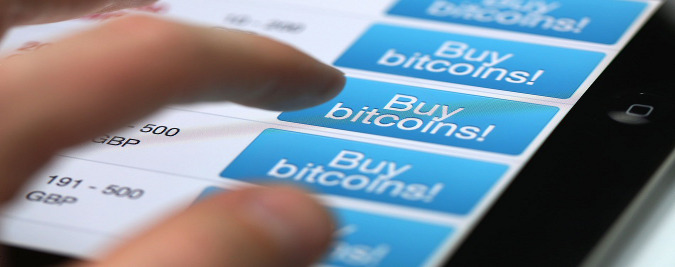
When one takes the monolithic leap from the political infancy of the two-party paradigm into the uncharted waters of "alternative" political views, the Ponzi scheme of fiat money and central banking is, inevitably, an issue that will eventually take center stage. While there are countless historical events that incite scrutiny in the minds of truth-seekers, (9/11, the Kennedy assassination, the drug trade, to name a few,) none are perhaps more blatantly dubious than the events of 1913 and the Jekyll Island coup d'etat. In the face of such obvious corruption and conspiracy, many turn their eye to an investigation of sound money and Austrian economics as a potential means of usurping financial control from the hands of these psychopathic banking oligarchs, and for the vast majority of economic history, the discussion of sound monetary alternatives to fiat currency revolved almost entirely around precious and semi-precious metals. In the digital age, however, this is no longer the case, as crypto-currencies of various kinds have burst onto the scene, invoking praise and controversy alike; the appeal is obvious, if not somewhat short-sighted. While gold and silver may be wonderful vehicles for wealth preservation, they're virtually impossible to transact with in the modern Western world, leading newfound advocates of alternative currencies to adopt a more "proactive" stance to combating the Fed's monopoly on exchange by settling trade in BitCoin, and, to a certain extent, I cannot fault this knee-jerk reaction.
...but that by no means implies that such a solution doesn't have tremendous issues.
Before I continue, I'd like to make one thing abundantly clear: As an ideologically principled agorist, I truly believe that competing currencies are not only the way of the future, but the ONLY way in which true market transparency can ever come to pass. As the digitization of modern life becomes more and more prevalent, I truly hope that crypto-currencies will play a role in this aforementioned agora, if only for the sake of convenience. Advocates of BitCoin will doubtlessly see this article as a pot-shot in the wake of the turbulent events occurring at Mt. Gox, but my criticisms of BitCoin, like a finely-aged wine, have been bottled up for quite some time now, simply waiting for an opportune moment to fill the decanter.
Consider this my uncorking.
1. Is BitCoin Money?
No, which is something I think the term "crypto-CURRENCY" itself makes abundantly clear, but I digress. BitCoin is an incredibly liquid form of credit, yes. It is a currency, certainly. But is BitCoin money in the Austrian sense? The word "currency" itself, in Middle English, curraunt, or "in circulation," has come to be synonymous in the modern age with State-issued bank notes, coins, and tokens of exchange; BitCoin is, of course, a privately issued form of currency, but a currency all the same, even sharing King Dollar's favored exchange token: Binary credit. Both the 1's and 0's on the ledger of J.P. Morgan's balance sheet and the 1's and 0's recently "liberated" from the digital coffers of Mt. Gox function as a medium of exchange. Their liquid nature ensures their value as asset classes, fulfilling the requirement of money as a store of value, and their digitized nature make each of them excellent (not to mention fungible) units of account. The fiat (or "by decree") nature of King Dollar is a primary concern of many Austrian-influenced libertarian thinkers, and is not a title that can be appended to BitCoin. However, despite fulfilling all of the "textbook" requirements of money, Rothbardian theory staunchly rejects both as adequate for this task. Why?
"A most important truth about money now emerges from our discussion: money is a commodity. Learning this simple lesson is one of the world's most important tasks. So often have people talked about money as something much more or less than this. Money is not an abstract unit of account, divorceable from a concrete good; it is not a useless token only good for exchanging; it is not a "claim on society"; it is not a guarantee of a fixed price level. It is simply a commodity." -Murray N. Rothbard, What Has Government Done to Our Money?
While I do not hold a universal acceptance of Rothbardian theory, I consider this point, as Rothbard does, fundamentally necessary to an understanding of economics. BitCoin has a great deal of utility, but it is not money, nor is it a commodity. It is a digitally liquid credit class, and while better than debt-based government notes and bonds, it should never be conflated with money itself.
2. BitCoin Has Unprecedented Counterparty Risk
And it's got it in spades. This risk of default, as has been recently demonstrated, is a virtual (no pun intended) inevitability in today's BitCoin market. Economics, like anything involving motion, has multiple points of articulation; the more channels and mechanisms required to perform this locomotion, the more potential there is for systemic failure. Perhaps BitCoin's greatest utility, its ease of online transaction, is facilitated almost entirely by State and corporatist infrastructure. The mining pools which make BitCoin available for discovery by the average consumer also rely exclusively on this network. BitCoin sale and transfer while mobile in the physical realm is done largely via SmartPhone applications, a nearly monopolized industry whose traffic is knowingly spied upon. Bear in mind that all of these tasks are also performed, in large part, by corporatist operating systems and hardware that deliberately facilitate NSA surveillance and compromised privacy through back doors. All of this without even addressing the risk of default brought on by highly motivated and incentivized State and non-State affiliated hackers, which is sure to continue so long as BitCoin is available for cash settlement.
Holders of BitCoin justify these risks and tacit, indirect support for State infrastructure by considering losses and compromises as acceptable to the ends of usurping State control of currency. To do so ignores the paramount concern that the same methods used to control dollar-based assets by Deep Political actors seem to be applicable to the BTC market, according to corporate whistleblower Richard Andrew Grove; a worrying trend indeed.
3. BTC Market Manipulation is Venerable Child's Play
This was covered at some length in the last segment, but the thesis bears refining and repeating. BitCoin and other AltCoin platforms are just as vulnerable to common pump-and-dump shenanigans as "traditional" markets. In fact, there is already a very active speculation community surrounding the likes of BitCoin, LiteCoin, and DogeCoin, just to name a few. This form of speculative investment and market manipulation, while hailed by some as simple market mechanisms of price discovery available in a free market, makes the holding and spending of such currencies a tremendous financial risk for ideologically motivated adopters.
The short-sale also has its crypto-currency equivalent, though the method by which it is carried out is far more morally questionable and involves none of the risk of traditional market shorting mechanisms. I am, of course, referring to the DDoS attacks so prevalent in the BitCoin world. The manipulation is simple: Take a major crypto-currency exchange offline, watch the price tumble, buy at a discount, and sell upon the inevitable price recovery that will doubtlessly coincide with the ceasing of the DDoS attack. Each of these are massive issues for BitCoin exchanges and investors, and while these issues are actively discussed at the technical level, there is little to no concern raised among BitCoin enthusiasts from a strictly economic perspective. This needs to change.
4. Tremendous Volatility is Bad for Spenders AND Savers
"Bad money drives out good." -Gresham's Law
The ease of transaction BitCoin offers over precious metals is not the only reason why crypto-currencies are more regularly circulated than gold and silver; Gresham's Law is an active element here as well. BitCoin is simply not suited as a consistent enough store of value in which to be saved. This is clearly the case, as there are a multitude of services offering the sale of gold and silver in BitCoin, but none offering that service in reverse. Some, like the anonymous Tyler Durdens of the popular financial blog Zero Hedge, have even speculated that some BitCoin holders are rotating into bullion. While this theory can't exactly be verified, the services which would facilitate such a move are doubtlessly in place.
Moreover, this extreme price volatility in BitCoin not only makes saving in it a form of wealth seppuku, but spending in it as well. No matter how enthusiastic one may be about the possibility crypto-currencies offer, it is an undeniable fact that a currency which can be devalued 25% in a single day is a terrible medium with which to exchange consistently. As (or if) BitCoin gains more adopters and "bad actors" like Mt. Gox are increasingly rooted out of the market, BitCoin may one day gain the price stability necessary to facilitate transactions without these tremendous risks. Even if this were to occur, however, the systemic risk to BitCoin price discovery and spending addressed above still pervade the market.
5. A Cashless Society is a Globalist's Wet Dream
"Communism is Soviet power plus the electrification of the whole country." -Vladimir Lenin
The use of the above quote, while provocative, is not a demonization of BitCoin itself; it is, however, a technocratic aim of globalism that deserves to be discussed seriously with regard to crypto-currencies. The implementation of technocracy is a long-standing goal of the global power "elite," and a cashless society is a necessary predicate to these technocratic aims. While BitCoin and the "digitized" dollar both facilitate control of transactions at the flip of a switch, only a 100% digital currency is a foolproof system of economic control. The nature of the BitCoin block chain itself addresses some of these concerns, but not the proverbial elephant in the room: The folks who make the computing devices on which BitCoin is transacted, from cell phones to RFID chips to desktops, are under the complete control of the Corporatocracy... just as the Rockefeller family wants it.
In Closing
Despite all of these concerns and vehement detractors, crypto-currencies are here to stay. I beg not only the question of BitCoin's relative ease of control by The Powers That Shouldn't Be, but a more fundamental question, as well: In a truly free society in which digital currencies couldn't be eliminated as competition by the gun of the State, would BitCoin and other non-asset based crypto-currencies go the way of the Dodo in the wake of encrypted commodity-backed currencies? The potential for not only gold and silver to be used in such a manner, but a wide basket of commodities, is certainly exciting, and Mother Earth's ability to usurp the block chain is a paradigm-shifting eventual development that will make even the most die-hard of BitCoin investors take a second look.


